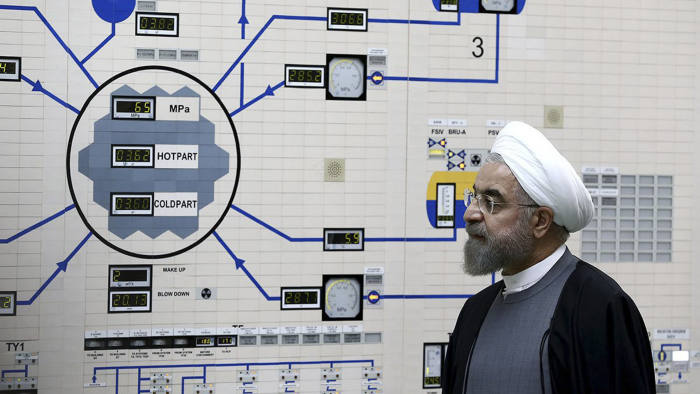Australia/Israel Review
Editorial: Opportunity on Iran
Jan 31, 2020 | Colin Rubenstein

Iranian President Hassan Rouhani boasted on Jan. 16 that his country is now producing enriched uranium at a greater pace than it was before the 2015 Joint Comprehensive Plan of Action (JCPOA) nuclear deal.
This claim only underlines again the sheer inadequacy of that deal. It was never an agreement to limit Iran’s ability to make nuclear bombs long-term – while it imposed some very temporary restrictions it actually facilitated a vast expansion of Iran’s nuclear capabilities longer term.
While Rouhani’s claim cannot be validated until the International Atomic Energy Agency (IAEA) releases its scheduled report next month, Elana DeLozier of the Washington Institute for Near East Policy has calculated that the claim is plausible if Iran uses both its pre-JCPOA inventory of IR-1 centrifuges and its recently activated faster and much higher-output advanced centrifuges.
Iran’s phase-in of those advanced centrifuges, perfected post-JCPOA, illustrates the fact that such centrifuge development was allowed by the JCPOA, facilitating massive expansion of future nuclear capabilities by Iran even if the JCPOA was fully adhered to. As even then US President Barack Obama admitted in April 2015, the deal’s permissiveness regarding Iran’s advanced centrifuge testing and deployment, and silence on ballistic missile development, meant that by the time the deal’s sunset clauses on restricted enrichment kicked in around 2025, Iran’s “breakout times [to a nuclear weapon] would have shrunk almost down to zero.”
Of course, in the wake of the US pullout from the deal in 2018, Iran has committed a litany of open violations of all the key elements of the JCPOA which have only accelerated in recent months. Iran has been exceeding the stockpiles of enriched uranium it’s allowed to have under the JCPOA; exceeding the levels of purity of enrichment the JCPOA allows; employing advanced centrifuges to enrich uranium even though this is prohibited by the JCPOA; and injecting uranium into centrifuges at the Fordow facility, which it is not allowed to use for enrichment under the JCPOA.
But, setting aside these violations, it is telling that only four years after the JCPOA came into effect, Iran already has been able to develop advanced enrichment capabilities which, according to former IAEA Deputy Director-General Olli Heinonen, could potentially produce enough highly enriched uranium for a nuclear bomb in just two months.
Therefore the Jan. 14 announcement by Britain, France and Germany that they would trigger the dispute mechanism of the JCPOA is very timely and should be embraced as a game-changer by the international community.
The move begins a process that, if seen through, would lead to the referral of the matter to the UN Security Council and the re-imposition of UN nuclear sanctions on Iran in as little as three months.
The European move is timely not simply because the Iranian nuclear breakout efforts need to be met with urgent action, but because Iran has also never been more vulnerable to outside pressure.
One of the major failings of the JCPOA was the way it considered the nuclear issue in isolation. It ignored the nature of Iran’s oppressive regime, its rogue behaviour as a state sponsor of terrorism, and its destabilising regional expansionism and projection of power through multiple means, including its own forces and bases in Syria, to outright proxies and malleable clients including groups like Hezbollah, Palestinian Islamic Jihad, the Houthis in Yemen and various Iraqi militias.
Iran’s use of proxies has served the regime well over the years in terms of deflecting responsibility and providing deniability for its actions on the international stage, but as Jonathan Schanzer points out in this edition, that mask has largely been lifted following the targeted killing of General Qassem Soleimani by a US drone on Jan. 3.
Key players in Iran’s proxy network, such as Beirut-based Hezbollah leader Hassan Nasrallah, have suddenly become much more open about being Iranian pawns, and no one with any sense today takes seriously Iranian claims that its proxies act independently.
The billions of dollars Teheran has invested in supporting Iran’s various foreign interests were supercharged by the financial windfall created by the JCPOA for Iran. Today, even under the weight of US sanctions, Iran continues to prioritise funding its military campaigns and sponsorship of terror groups and proxies over the needs of the Iranian people, but is nonetheless increasingly struggling to find the funds it needs as the Iranian economy sharply contracts.
At grave risk, protesters inside Iran have courageously challenged the regime over policies that are so much at odds with the interests of the Iranian people, especially after the mistaken downing of a Ukrainian passenger airliner by the Iranian military on Jan. 8, which seems to have aroused outrage and anger among many Iranians.
And abroad, the Iranian empire is under huge pressure from unprecedented popular anger welling up against it in key outposts, like in Iraq and Lebanon.
This unrest, the potential European support for a snapback of UN nuclear sanctions on Iran, and the cumulative effect of the Trump Administration’s “maximum pressure” sanctions campaign have created a genuine opportunity to coax Iran back to the negotiating table to reformulate a better, stronger nuclear deal that, instead of facilitating Iran becoming a nuclear weapons power in the longer term, slams the door shut on these nuclear ambitions permanently. Furthermore, any new deal must place such negotiations firmly in the context of the Iranian regime’s corrosive behaviour at home and in the region.
While it’s crucial the P5+1 countries which negotiated the original JCPOA adopt this paradigm shift, the entire international community has a role to play in bringing it about. This is also true of Australia, which maintains an embassy in Teheran, and would strongly serve its own national interests by further contributing to the current growing international pressure on Iran, encouraging it to cease its dangerous policies of promoting terrorism, destabilisation and proliferation.






